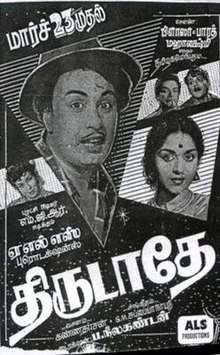Thirudathe
Thirudadhe (transl. Do Not Steal) is a 1961 Tamil language drama film directed by P. Neelakantan. The film features M. G. Ramachandran, B. Saroja Devi and M. N. Nambiar in lead roles. The film, produced by V. Arunachalam, had musical score by S. M. Subbaiah Naidu and was released on 23 March 1961. Thirudathe was an Blockbuster film and highest grossing of the year and ran more than 150 days in major cities and the maximum run was 154 days.[2] The film was remade in Kannada as Manassakshi with Rajkumar, and later dubbed into Telugu and released as Jebudonga – 13-09-1961
| Thirudathe | |
|---|---|
 Theatrical release poster | |
| Directed by | P. Neelakantan |
| Produced by | V. Arunachalam |
| Screenplay by | Kannadasan Ma. Lakshmanan |
| Story by | Chinna Annamalai |
| Starring | M. G. Ramachandran B. Saroja Devi M. N. Nambiar |
| Music by | S. M. Subbaiah Naidu |
| Cinematography | V. Ramamoorthy |
| Edited by | R. Devarajan |
Production company | A. L. S. Productions |
Release date |
|
Running time | 173 minutes |
| Country | India |
| Language | Tamil |
Plot
Balu is a small-time thief, once he happens to steal money from Sarojadevi's brother who is the breadwinner of the family. After his death the family has to be taken care by Balu, his stealing attitude changes when his mother came to know that his son was a thief and sacrifices her life. How the family is saved forms the rest of the story.
Cast
- M. G. Ramachandran as Balu
- B. Saroja Devi as Savithri
- M. N. Nambiar as Ponnambalam / Duraisingam
- K. A. Thangavelu as Jambu
- Chittor V. Nagaiah as Orphanage owner
- M. N. Rajam as Tharaa
- A. Karunanidhi as Marikozhundhu
- Kula Deivam V. R. Rajagopal
- M. Saroja as Padma
- K. Kannan as Singaram
- G. Sakunthala as Kaveri
- S. Rama Rao as Money lender
- M. K. Mustafa as Raju
- Lakshmiprabha
Production
The film was directed by P. Neelakandan and V. Arunachalam under A. L. S. Productions, with story written by Chinna Annamalai and dialogues written by Kannadasan and Ma. Lakshmanan.[3] Lakshmanan came up with two titles for the film: Thirudathe ("Do not steal") and Nalladhukku Kaalamillai ("Goodness stands no chance"), recommending the latter. M. G. Ramachandran objected, believing that audiences would think the title represented his own opinion, and that the film actually exhorts people not to do wrong. Hence, the former title was finalised.[4]
Soundtrack
The music was composed by S. M. Subbaiah Naidu. Lyrics by Pattukkottai Kalyanasundaram, Kannadasan, Ku. Sa. Krishnamoorthi, Ku. Ma. Balasubramaniam, M. K. Athmanathan, Muthukoothan and Ra. Pazhanisami.
The song Ennaruge Nee Irundhal was composed by Viswanathan-Ramamoorthy. It was recorded for an earlier film produced by ALS, but was not used due to that film's length. With the permission of S. M. Subbaiah Naidu, producer A. L. Srinivasan used that song in this film. However, credit was not given to Viswanathan-Ramamoorthy in the title.[5]
The philosophical song Thirudaathae Paappaa Thirudaathae is the top most in the film, the lyric is by Pattukottai Kalyanasundaram depicting the evils of stealing, and in the last stanza he gives the solution for eliminating robbery from the world.[6]
| No. | Song | Singers | Lyrics | Length (m:ss) |
|---|---|---|---|---|
| 1 | "Acha Baguthacha" | S. C. Krishnan & A. G. Rathnamala | Ra. Pazhanisami | 02:10 |
| 2 | "Aasey Machchan.... Azhagaan Chinna Ponnu" | Seerkazhi Govindarajan & Jikki | Ku. Sa. Krishnamoorthi | 02:49 |
| 3 | "Anthisayum Nerathiley" | A. L. Raghavan & A. G. Rathnamala | ||
| 4 | "En Aruge Nee Irundhaal" Viswanathan-Ramamoorthy | P. B. Sreenivas & P. Suseela | Kannadasan | 02:55 |
| 5 | "Kannum Kannum Sernthathu" | P. B. Sreenivas & K. Jamuna Rani | 04:01 | |
| 6 | "Mama Mama Makku Mama" | P. Suseela & A. L. Raghavan | Ku. Ma. Balasubramaniam | 02:24 |
| 7 | "O Mister Baalu" | Jikki | 02:47 | |
| 8 | "Thirudaadhe Paapa Thirudaadhe" | T. M. Soundararajan | Pattukkottai Kalyanasundaram | 03:21 |
| 9 | "Anbale Thannuyirai" | Seerkazhi Govindarajan | M. K. Athmanathan |
Reception
This is MGR's first successful social movie in which MGR used modern dress in Thirudathe.
After the stupendous success of Nadodi Mannan and his stage accident in Sirghazli 0n 16.6.1959 MGR movie releases subsequently were not equivalent to the collection did by Nadodi Mannan, this kind of drawback gave the impression that MGR's career is centered on historical or period films and he cannot fare in social-oriented movies.
The myth finally vanished with the release of Thirudathe on 23 March 1961. This movie gave MGR the needed uplift to another stage in his golden career and social movies become the center stage and historical or period movies went into the back seat.[7]
In action scenes MGR is always the best, the fight inside the house of M. N. Rajam using household materials for defense; this natural fight is still used in Jackie Chan movies. The climax fight is worth mentioning; the fight takes place in the light of a rolling table lamp, we will be on the edge of our seats before the fight finishes.[8]
References
- "Thirudathe". The Indian Express. 23 March 1961. p. 10.
- "Thirudathe Records". mgrblog. Retrieved 22 November 2014.
- http://www.lakshmansruthi.com/cineprofiles/1961-cinedetails12.asp
- Kannan, R. (2017). MGR: A Life. India: Penguin Random House. p. 90.
- "Sangeetha Aiya S. M. Subbaiah Naidu" (in Tamil). thamizhstudio.com. Archived from the original on 25 November 2016.
- "Thirudathe Songs". raaga. Retrieved 22 November 2014.
- "Thirudathe Reviews". mgrblog. Retrieved 22 November 2014.
- "Thirudathe Golden Jubilee". mgrroop. Retrieved 22 November 2014.
External links
- Thirudathe on IMDb